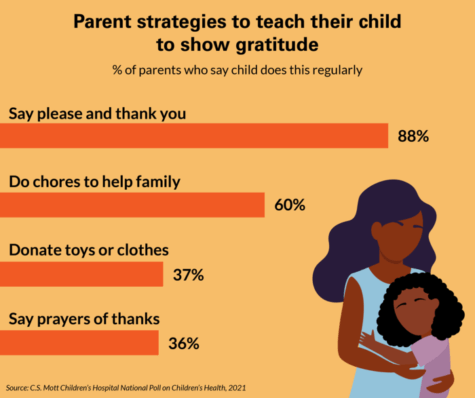ANN ARBOR, Mich. (StudyFinds.org) – Although Thanksgiving and the holiday season are giving many people an opportunity to celebrate and appreciate their loved ones, a new poll finds most parents think their kids have some catching up to do in the thankfulness department. A new poll by University of Michigan researchers reveals a stunning four in five parents think children today don’t appreciate what they have.
Over half the survey of 1,125 parents with kids between four and 10 years-old add they believe they spoil their children too much. Another two in five go even further, saying they’re sometimes “embarrassed by how selfish their child acts.”
“Many parents may look back to their own childhood and, in comparison, wonder if they are giving their child too much in the way of material things. Parents may have watched their child behave selfishly, such as refusing to share with other children or saying they don’t like a particular gift,” says the co-director of the C.S. Mott Children’s Hospital National Poll, Sarah Clark, M.P.H. in a university release.
“We know that gratitude is associated with more positive emotions, having strong relationships, enjoying more experiences and even health benefits,” she adds. “However, gratitude is not something that children usually acquire automatically; it needs to be nurtured, in an age-appropriate way.”
It all starts with ‘please’ and ‘thank you’

Despite the struggles of many moms and dads, three in four say teaching their kids about gratitude is a high priority. With that in mind, the vast majority of the poll believe gratitude all starts with good manners. Nearly nine in 10 (88%) regularly encourage their children to say “please” and “thank you.” Another 11 percent say do this occasionally and just one percent admit they rarely have their kids say please and thanks.
While saying thank you is a start, researchers caution that it’s important for children to know why they’re giving thanks. One way of doing this is by encouraging kids to say “thank you for…” so children have to explain why they’re appreciative.
“There’s a difference between politeness and gratitude,” Clark says. “To help children learn to be grateful, parents also need to emphasize why they are asking their child to say thanks.”
When it comes to getting gifts at a party, just one in four parents say their child writes thank you cards to gift givers all the time.
Helping out at home can teach gratitude
Three in five parents try to teach gratitude through actions instead of words — usually through having their kids regularly do chores to help the family. One in three occasionally have their children help out with household tasks.
The Michigan team says parents can help reinforce this lesson by explaining that everyone in the family has an obligation to help each other.
“This can help children to appreciate their role in the ‘greater good’ and nurtures their sense of gratitude,” Clark explains.
Giving back builds thankfulness
For many parents, the best way to get their children to be appreciative is by giving back to others. For two-thirds of the poll, that means involving their kids in volunteer work, either with actual community groups or informally by helping out neighbors and relatives.
“It’s a natural step to go from helping with household chores to volunteering with neighbors or at a school or community event,” Clark continues. “To help nurture children’s sense of gratitude, parents may want to give an age-appropriate explanation of the reason for the activity and how it will be helpful to others.”
Another one in three parents have their children donate old and unused toys or clothing to charity. However, when it comes to something kids have an attachment to, study authors say parents shouldn’t force kids to donate — it should be a natural decision they make on their own.
“Children may be resistant to donating old toys at first not because they still want to play with them but possibly because they feel like a lack of control,” Clark concludes. “Parents should empower them to make these decisions themselves and gently help them see how their generosity could bring happiness to another child.”






